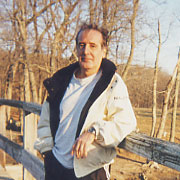 1960-2002, A Testimony
1960-2002, A Testimony
(in honor of Thomas Lily)
1
From our graves, where our life's summation
will be "here lies an old generation,"
what shall we answer the young,
those who found words of innocence?
Who will bring a fresh bud to the tombs
of men who breathed among flowers of doom?
Who will rouse us from darkness
to open eyes that are sightless
to a new epoch's light?
2
At the hour when the earth lies
between sleep and waking, and in man's blood
shadows not alive yet
fight the ghosts of the dead,
I looked into myself, me not a ghost nor a shadow.
Like one who finds himself at a crossroad
and knows nothing of the town he's looking for,
only intent on leaving a land
that does not concern him,
so suspended on the edge of actions
that took place and those yet to be,
I felt torn between hope and nostalgia.
Cognizant of my plight, but ignorant of its meaning,
I chose not to vent my agonizing question
on 'their' mistakes, on my mistake, on what we should be and are not,
but simply registered traces of pain on men's faces
and the cortege of numberless generations,
the many human races, the infinite descendants,
and what we are: the survivors.
From London streets, from the blast of Nagasaki,
from Detroit dumps and Jewish ghettos I heard
one cry repeat itself like an echo.
3
I remember it was 1945,
the year when death was always two steps from man;
nobody questioned life's purpose any longer,
war seemed the screech of twenty centuries in ruin.
Even now, if we scream, that scream
is merely an echo of that horror,
and of the Holocaust, the concentration camps,
1,250,000 Soviet soldiers
dead to defend Stalingrad.
Even now I hear the refugee's step, the cadence
of retreating armies, the death throes of three men
hanged from three trees,
the cry of children afraid of fires.
But we had learned not to cry: what use is a tear
when disaster buried a whole generation?
We know that a father can betray his son
and a mother give away her daughters
when a chunk of bread is the only truth.
4
Our mistake was to believe that history's plan
could be drawn in the short span of one generation.
In reality, the glorious halo
that one evening lit up our foreheads
was the flame of a candle dripping in an air-raid shelter;
the imprints of our deeds have been engraved
in our worn-out clothes. Our monument
was the threshold of a profaned synagogue.
In memory of the time when the only bread
was man's sorrow, the only water man's tears,
and the only rest man's death,
on the ashes of the pyre that burned bodies and souls
throng the bleeding shadows of the witnesses.
5
If we now think for an instant
of what was good but was done badly,
and of what was not even attempted
or only begun;
if we think that at the hardest hour
we always arrived late
when nothing could be done and the chasm was open wide,
what other suggestion will we find
in our past but the anguished wish
to know that a humble fruit at least
will be born even out of mistakes?
Burn, baby, burn. Riots devastate Watts.
John Kennedy killed by a sniper. King killed. Malcolm killed.
Bob Kennedy killed. Buddhist monks
set themselves on fire.
Bush declares war on Iraq.
Clinton sends more planes to Belgrade.
"We went halfway round the world
to do what's moral and just and right."
Slobodan issues ethnic cleansing.
The WTC is razed to the ground.
George W. Bush attacks Afghanistan.
6
The political kaleidoscope shifts and shifts,
the old patterns are unrecognizable,
except in the faces of the new refugees.
The sobbing young mothers, the helpless young men,
the terror-filled eyes of the children,
the deathly despair of the old -
these are the searingly familiar images.
I see them walking in the flickering light of defeat:
the faces of mercy and patience, of innocence and guilt;
the tiredness of the old man who cuts his wrists;
three rival families amassed in one room.
I see them walking in a world covered with ashes,
yet ashes scattered by a hidden fire -
necessary mulch for a new, slow flowering.
I see the obscure trails of our passion,
the ways of sweat and sorrow, the desert that watches
impassively the retreat of beaten armies:
these are the places roiled by the wind of havoc
where man fell on his knees
and hailstones destroyed the harvest.
These are the landscapes of sudden death and tragic resurrection.
But there is no conclusion. Even man's return to dust
does not exist. The soldier who died
with his hands clutching his face not to see the end,
the mason crushed by faulty scaffolding,
the Kosovars hunted down by Serbs -
are not the last syllables of a concluded speech,
the final boulders of a colossal landslide,
but the just plowed ground, a polished stone.
This way, the murderer gave life back to his victim:
a funeral brings us home, a drought soothes
the thirsty man's lips, reading begins
now that each has thrown his book onto an old shelf.
7
JANUARY 2002
Whiten, you moon of pity, senseless wars -
friendliest of spheres that for all those who died
recline your blameless head upon the snow.
Bring back the voice that used to tell us children:
how beautiful the night, how good it is
to love us cuddled in a sleep of snow.
And as you waxed, we saw the whole world leaning
into the sky, and men walking towards
a dawn through what looked like flowers of snow.
Then everything remained just memory,
the sweetest border of a peaceful earth,
a not too far white celebration - snow.








